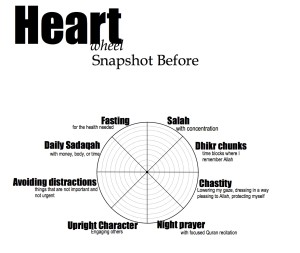Yesterday was our last homeschooler’s park day with our Muslim homeschoolers group. The little kids got to run and play at the playground, and check out the waterfall at the park. For the older kids I brought The Heart Wheel Journal, created by Muhammad Alshareef, for a teen halaqa session. The entire journal adds up to 135 pages, largely consisting of daily check-ins to gauge how you’ve done each day with your fasting and worship. We followed the instructions from the journal for the first few pages (up to page 5), and I put halaqa discussion items in bold.
We worked on the first few pages together, first focusing on the feelings we have when we are close to Allah. If I do this again, I think I would start off with an exercise in listing emotion words. The girls had a little bit of a hard time describing their feelings beyond “happy”, and I think if we just thought of emotion words first, that could have helped narrow down their feelings. Some words to start the discussion would be: satisfied, content, worried, elated, and discouraged. I think these words will in sha Allah open up the minds to deeper words than just happy, sad, mad, and all that. Having IEW’s handy list of quality adjectives next to us would help, too!
After we talked about how it would make us feel, the next page is why we MUST work towards this. This was a little harder for the girls to wrap their mind around. They first started out listing things they must do like prayer, fasting, and charity, but the questions is why must we work towards getting closer to Allah, not how we must do it. The discussion then moved to how we will be more satisfied with ourselves, more motivated to do better because we feel better about ourselves, and in sha Allah we will work towards an honorable place in Jannah.
The next two pages are the heart wheel which the journal is named after. First, you start with assessing where you are in each area: Salah, Dhikr, Chastity (and I reminded the girls it isn’t just about virginity, it’s about lowering the gaze also), Night prayer, Upright character, Avoiding distractions, Daily sadaqah, and Fasting. I told them to not give away their sins, and if they didn’t want others to see where they rate themselves, they should still think about it and write their number small enough so they can see it but the others can’t. I asked them what one category they want to work on the most and both of the older girls said they wanted to work on avoiding distractions, which isn’t surprising in our society.
Lastly, we worked on the second heart wheel page and listed action items to get each category to it’s maximum level. We talked about what the easiest one would be, and what would be the most challenging. I suggested that they start with the easiest one, and then almost immediately after start working on the hardest one. With a little sense of accomplishment under their belt, the harder goal can be chipped away and in sha Allah make significant progress by the end of Ramadan, and use that as a catalyst for permanent change.
Throughout the worksheets, we also talked about how Shaytan attacks those that are on the right path the most, and how we can’t ever feel like we are done. Our whole life we are going to need to keep working to be better people. That job is never done.
In sha Allah they benefited from the discussion and make real progress and positive change this Ramadan. The days are long, but they laughed a bit when I joked with them how they can tell their future kids, “You know, when I was a kid, we had to fast 17 hours! You have it easy!”





wondering if you continued with it… thoughts and reflections?
We enjoyed it for the year we used it, but consistency is the key, and I have a hard time with that. I do find it valuable for personal reflection. Especially for kids, it needs to be an exercise they want to do, and not only an assignment from Mom in order to have its desired effect.